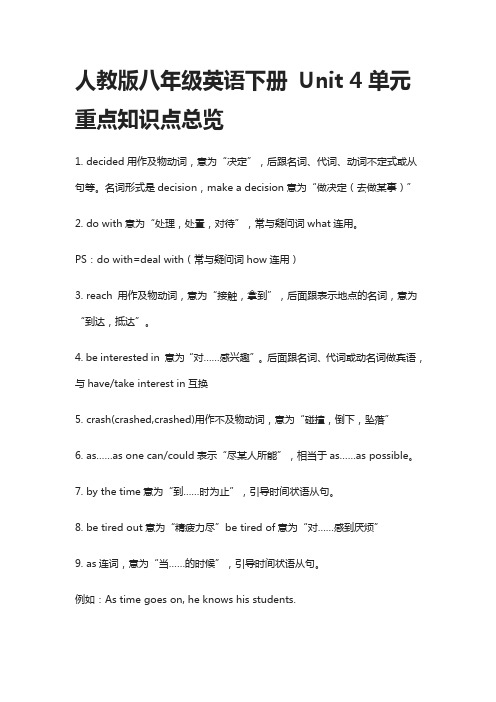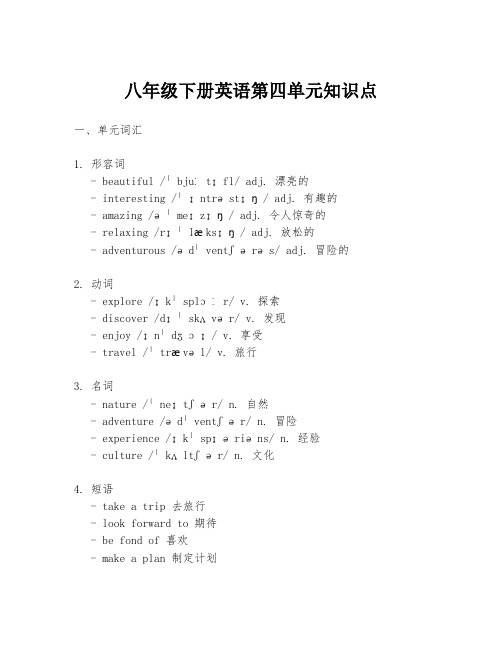新版八年级英语(下册)第四单元知识点归纳(良心出品必属精品)
人教版八年级英语下册 Unit 4单元重点知识点总览

人教版八年级英语下册Unit 4单元重点知识点总览1. decided用作及物动词,意为“决定”,后跟名词、代词、动词不定式或从句等。
名词形式是decision,make a decision意为“做决定(去做某事)”2. do with意为“处理,处置,对待”,常与疑问词what连用。
PS:do with=deal with(常与疑问词how连用)3. reach 用作及物动词,意为“接触,拿到”,后面跟表示地点的名词,意为“到达,抵达”。
4. be interested in 意为“对……感兴趣”。
后面跟名词、代词或动名词做宾语,与have/take interest in互换5. crash(crashed,crashed)用作不及物动词,意为“碰撞,倒下,坠落”6. as……as one can/could表示“尽某人所能”,相当于as……as possible。
7. by the time意为“到……时为止”,引导时间状语从句。
8. be tired out意为“精疲力尽”be tired of意为“对……感到厌烦”9. as连词,意为“当……的时候”,引导时间状语从句。
例如:As time goes on, he knows his students.10. tie(tied,tied,tying)用作及物动词,意为“捆,绑,系”,tie…to…意为“把……系/捆到……上”。
be tired to是它的被动语态,意为“被捆到……上”11. until用作连词,意为“直到……为止”,在(某一特定的时间)之前,其主要用法有:与延续性动词连用时,表示“直到……”,动词用肯定形式,指主句的动作一直持续到until后的动作发生为止;not…until…意为“直到……才……”,主句动词通常为非延续性动词,指主句的动作一直到until后的动作发生时才发生。
12. the same size as…意为“和……一样尺寸,与……一样大小”。
八年级英语下册Unit4单元知识点

八年级英语下册Unit4单元知识点八年级英语下册Unit4单元知识点八年级英语Unit4单元知识需要掌握每一个重要的知识点,会让你在Unit4单元英语考试中顺利通过。
以下是店铺给你推荐的八年级英语下册Unit4单元知识点归纳,希望对你有帮助!Unit4单元知识点:重点短语一1. have free time有空闲时间2. allow sb. to do sth. 允许某人做某事3. hang out with sb. 与某人闲逛4. after-school classes课外活动课5. get into a fight w ith sb. 与某人吵架/打架6. until midnight直到半夜7. talk to sb. 与某人交谈8. too many太多9. study too much学得过多10. get enough sleep有足够的睡眠11. write sb. a letter给某人写信12. call sb. up打电话给某人13. surprise sb. 令某人惊讶14. look through翻看15. be angry with sb. 生某人的气16. a big deal重要的事17. work out成功地发展;解决18. get on with不 11睦相处;关系良:19. fight a lot经常吵架/打架20. hang over笼罩21. refuse to do sth. 拒绝做某事Unit4单元知识点:重点短语二offer to do sth. 主动提出做某事so that以便mind sb. doing sth. 介意某人做某事all the time一直in future今后make sb. angry使某人生气worry about sth. 担心某事copy one’ s homework抄袭某人的作业be oneself做自己family membersspend time alone独自消磨时光give sb. pressure给某人施压have a fight w ith sb. 与某人吵架compete w ith sb. 与某人竞争free time activities业余活动get better grades取得更好的成绩give one’ s opinion提出某人的观点learn exam skills学习应试技巧practice sports体育训练cause stress造成压力cut out删除Unit4单元知识点:重点句型1. I studied until mid night last night so I did n‘t get enough sleep.我昨晚学习到半夜所以睡眠不足。
八年级下册英语第四单元2d知识点

第四单元是关于学校生活的话题。
2d部分主要涉及到词汇、语法和句型等方面的知识。
以下是对这些知识点的详细解析。
一、词汇1.主语:主语是句子的核心成分,表示动作的执行者或动作所作用的对象。
例句:My sister often helps me with my homework.(我的妹妹经常帮助我做作业。
)在这个句子中,主语是“My sister”。
2.宾语:宾语是句子中动作的承受者或接受者。
例句:I saw a movie last night.(昨晚我看了一部电影。
)在这个句子中,“a movie”是宾语。
3.形容词:形容词用来描述名词的特征、性质或状态。
例句:The red apple is delicious.(红苹果很好吃。
)在这个句子中,“red”是形容词。
4.副词:副词用来修饰动词、形容词、其他副词或整个句子。
例句:She sings beautifully.(她唱歌唱得很美。
)在这个句子中,“beautifully”是副词。
5.介词:介词用来表示一个名词与其他成分(如时间、地点、方式等)之间的关系。
例句:I went to the park with my friends.(我和我的朋友一起去了公园。
)在这个句子中,“with”是介词。
二、语法1.一般现在时:用来表示经常发生的动作、普遍真理、固定的时间表、客观事实等。
例句:I play basketball every Sunday.(我每个星期天打篮球。
)2.一般过去时:用来表示过去发生的动作或存在的状态。
例句:He studied English last night.(昨晚他学习了英语。
)3.名词所有格:用来表示名词的所属关系。
例句:This is my brother's book.(这是我弟弟的书。
)4.比较级和最高级:用来对两个或多个人或物进行比较。
例句:Tom is taller than Mike.(汤姆比迈克高。
新版八年级英语下册第四单元知识点归纳

新版八年级英语下册第四单元知识点归纳Unit 4 Why don’t you talk to your parents?Why don’t you talk to your parents? 你为什么不和你打父母谈谈呢?【解析】Why don't you do sth ?= Why not do sth? 为什么不......呢?【拓展】用于提建议的句型有:(1)What about doing sth ?=How about doing sth? ….怎么样?(2)Why don’t you do sth?= Why not do sth? 为什么不呢?(3)Let’s do sth.让我们一起做某事吧。
(4)Shall we/I do sth?我们做…好吗?(5)had better do/not do sth 最好做/不做某事(6) Will/Would you please do sth 请你做…好吗?(7) Would you like to do sth? 你想去做某事吗?(8)Would you mind doing sth?你介意做某事吗?【回答】(1). 同意对方的建议时,一般用:◆ Good idea./ That’s good idea. 好主意◆OK/ All right./ Great 好/ 行/太好了◆ Yes, please ./ I’d love to 是的/ 我愿意◆ I agree with you 我同意你的看法◆ No problem 没问题◆Sure/ Of course/ Certainly 当然可以◆Yes, I think so 对,我也这样想(2).对对方的帮助或要求表示委婉谢绝时,一般用:◆ I don’t think so 我认为不是这样◆Sorry, I can’t 对不起,我不能◆I’d love to, but…◆ I’m afraid…我愿意,但恐怕……I have to study too much so I don’t get enough sleep.我要学的太多,因此我睡眠不足。
八下英语第四单元知识点归纳

八下英语第四单元知识点归纳1. Vocabulary- Vocabulary related to travel and transportation, suchas journey, destination, arrival, departure, taxi, subway, highway, etc.- Vocabulary related to asking for and giving directions, such as turn left, turn right, go straight, etc.2. Grammar- The use of the present continuous tense to talk about future plans and arrangements, e.g. "I am meeting my friendat the airport tomorrow."- The use of imperatives to give commands or instructions,e.g. "Take the second left at the traffic lights."3. Sentence Patterns- How to use "How do I get to...?" to ask for directions, e.g. "How do I get to the nearest bus stop?"- How to use "Can you tell me the way to...?" to ask for directions, e.g. "Can you tell me the way to the train station?"4. Expressions- Expressions for giving directions, such as "It's on the left/right," "Just go straight," "It's next to/in frontof/behind," etc.- Expressions for asking for help, such as "Excuse me, could you help me?" "I'm lost, can you show me the way?"5. Writing- How to write a simple travel itinerary, including the date, time, destination, and activities planned.6. Reading- Reading passages about travel experiences,transportation options, and asking for directions inunfamiliar places.7. Listening and Speaking- Practicing listening for and understanding directions given by others, as well as practicing giving clear and concise directions to others.Overall, this unit focuses on helping students develop essential language skills for travel and transportation, including vocabulary, grammar, sentence patterns, expressions, writing, reading, listening, and speaking.。
人教版英语八年级下册 Unit4 知识点总结

Unit 4 知识点Section A词组1.have free time有空闲时间2. allow sb. to do sth.允许某人做某事3. hang out with sb. 与某人闲逛4. too many after-school classes太多的课外补习班5. too much homework 太多的作业6. get into a fight with sb.与某人打架7. until midnight直到半夜 8. talk to sb.与某人交谈9. get enough sleep得到足够的睡眠 10. write sb. a letter给某人写信11. call sb. up打电话给某人 12. look through翻看;浏览13. surprise sb.使某人惊讶 14. in surprise(n.)惊讶地15. to one’s surprise令某人惊讶的是 16. be surprised at sth. 对…感到惊讶17. be surprised to do sth. 对做某事感到惊讶18. be angry with sb. 生某人的气 19. a big deal重要的事20. work out成功地发展;解决 21. get on/ along with 和睦相处;关系良好:22. fight a lot经常吵架/打架 23. hang over笼罩24. refuse to do sth. 拒绝做某事 25. feel lonely and nervous 感到孤单焦虑26. argue with sb. about sth. 为某事与某人争吵 27. have an argument with sb.28. offer sb. sth.=offer sth. to sb.向某人提供某物 29. offer to do sth. (主动)提出做某事30. communicate with sb. 与某人交流/沟通 31. 未经询问做某事 do sth. without asking32. mind sb./one’s doing sth. 介意某人做某事 33. 担心 be worried about/ worry about34. explain sth. to sb. 向某人解释某事 explain +(to sb.)+ 宾语从句。
人教部编版八年级英语下册第4单元笔记重点汇总(可直接打印)

Section A 第一课时笔记重点短语1.have free time有空闲时间2.allow sb. to do sth. 允许某人做某事3.hang out with sb. 与某人闲逛4. after-school classes课外活动课5. get into a fight with sb./ have a fight with sb. 与某人吵架/打架6. until midnight直到半夜7. talk to sb. 与某人交谈8. get enough sleep有足够的睡眠9. write sb. a letter给某人写信10. call sb. up打电话给某人重点单词1、allow作动词,意为“允许”。
(1)allow sb. to do sth. 允许某人做某事His parents don’t allow him to hang out with his friends.他的父母不允许他和朋友出去闲逛。
(2) allow sth. “允许某事”I don't think she will allow it. 我想她不会允许这件事情。
(3) allow doing sth.“允许做某事”We don't allow smoking in our house.在我们家不允许抽烟。
(4) be allowed to do sth.“被允许做某事”Passengers are not allowed to smoke on the bus.在公交车上,乘客不允许抽烟。
2、find sb. doing sth. 发现某人在做某事其中的doing(现在分词)作宾语补足语。
类似的还有: see/watch/hear/notice/feel sb. doing sth. ,意为“看到/观察到/听到/注意到/感觉某人在做某事”。
3、词语辨析:太多:too much+ 不可数名词例:too much homework太多作业太多:too many + 可数名词复数例:too many people太多人太: much too+ 副词或形容词例:much too salty 太咸重点句型1、What’s wrong with. . . ? 意为“……怎么了? ”相当于What’s the matter with. . . ?2、表建议的句型:(1)你为什么不……Why don't you +V原? = Why not +V原例:Why don’t you talk to your parents.=Why not talk to your parents.(2)你应该/可以…You should/could +v.(3)你最好(不)…You’d better (not) +v.(4)你介意….. Would you mind doing…?(5)……怎么样?What about…? =How about…?(6)你认为……怎么样?What do you think of…? = How do you like…? Section A 第二课时笔记重点短语1. look through快速查看;浏览2. be angry with sb. 生某人的气3. a big deal重要的事4. work out成功地发展;解决5. get on with = get along with和睦相处,关系良好6. fight a lot经常吵架/打架7. hang over笼罩8. refuse to do sth. 拒绝做某事9. offer to do sth. 主动提出做某事10. be nice to sb.”对某人友好”相当于be friendly/good/kind to sb.11. mind sb. doing sth. 介意某人做某事12. in future今后13. make sb. angry使某人生气14. worry about sth. 担心某事重点单词1.(1)fight做名词:get into a fight with sb.=have a fight with sb. 与某人吵架/打架(2)做fight 动词:fight with sb. 与某人吵架/打架2. argueargue作动词,意为“争论,争吵”。
八年级下册英语第四单元知识点

八年级下册英语第四单元知识点一、单元词汇1. 形容词- beautiful /ˈbjuːtɪfl/ adj. 漂亮的- interesting /ˈɪntrəstɪŋ/ adj. 有趣的- amazing /əˈmeɪzɪŋ/ adj. 令人惊奇的- relaxing /rɪˈlæksɪŋ/ adj. 放松的- adventurous /ədˈventʃərəs/ adj. 冒险的2. 动词- explore /ɪkˈsplɔːr/ v. 探索- discover /dɪˈskʌvər/ v. 发现- enjoy /ɪnˈdʒɔɪ/ v. 享受- travel /ˈtrævəl/ v. 旅行3. 名词- nature /ˈneɪtʃər/ n. 自然- adventure /ədˈventʃər/ n. 冒险- experience /ɪkˈspɪəriəns/ n. 经验- culture /ˈkʌltʃər/ n. 文化4. 短语- take a trip 去旅行- look forward to 期待- be fond of 喜欢- make a plan 制定计划二、语法点1. 一般将来时- 用法:表示将来某一时间要发生的动作或状态。
- 结构:主语 + will + 动词原形 + 其他。
2. 现在进行时表示将来- 用法:表示按计划或安排将要发生的动作。
- 结构:主语 + am/is/are going to + 动词原形 + 其他。
3. 形容词的比较级和最高级- 用法:比较两者或三者以上的人或事物。
- 结构:比较级 - 更…,最高级 - 最…。
三、重点句型1. I can’t wait to…- 用法:表示迫不及待要做某事。
- 例句:I can’t wait to see the Eiffel Tower.2. It’s a good idea to…- 用法:表示做某事是个好主意。
- 1、下载文档前请自行甄别文档内容的完整性,平台不提供额外的编辑、内容补充、找答案等附加服务。
- 2、"仅部分预览"的文档,不可在线预览部分如存在完整性等问题,可反馈申请退款(可完整预览的文档不适用该条件!)。
- 3、如文档侵犯您的权益,请联系客服反馈,我们会尽快为您处理(人工客服工作时间:9:00-18:30)。
新版八年级英语下册第四单元知识点归纳Unit 4 Why don’t you talk to your parents?Why don’t you talk to your parents? 你为什么不和你打父母谈谈呢?【解析】Why don't you do sth ?= Why not do sth? 为什么不......呢?【拓展】用于提建议的句型有:(1)What about doing sth ?=How about doing sth? ….怎么样?(2)Why don’t you do sth?= Why not do sth? 为什么不呢?(3)Let’s do sth.让我们一起做某事吧。
(4)Shall we/I do sth?我们做…好吗?(5)had better do/not do sth 最好做/不做某事(6) Will/Would you please do sth 请你做…好吗?(7) Would you like to do sth? 你想去做某事吗?(8)Would you mind doing sth?你介意做某事吗?【回答】(1). 同意对方的建议时,一般用:◆ Good idea./ That’s good idea. 好主意◆OK/ All right./ Great 好/ 行/太好了◆ Yes, please ./ I’d love to 是的/ 我愿意◆ I agree with you 我同意你的看法◆ No problem 没问题◆Sure/ Of course/ Certainly 当然可以◆Yes, I think so 对,我也这样想(2).对对方的帮助或要求表示委婉谢绝时,一般用:◆ I don’t think so 我认为不是这样◆Sorry, I can’t 对不起,我不能◆I’d love to, but…◆ I’m afraid…我愿意,但恐怕……I have to study too much so I don’t ge t enough sleep. 我要学的太多,因此我睡眠不足。
【解析1】(1)too many + 复数名词许多 too many people(2)too much +不可数名词许多 too much homework(3)much too +形容词太… much too cold【解析2】so conj. 因此 (表示因果关系,后面跟表示结果的句子,不与because同时使用)My parents don’t allow me to hang out with my friends. 我的父母不允许我和我的朋友们出去闲逛。
【解析】allow sb. to do sth 允许某人做某事【拓展】allow v 允许allow doing sth 允许做某事They don’t allow smoking. allow sb. to do sth 允许某人做某事My mother allows me to watch TV.be allowed to do sth 被允许做某事①We don’t allow ___________(smoke) in the reading room.②Our teacher allows us ____________(go) out for a walk.③The boy should be allowed____(play) after supper.④We won’t allow ________in the cinema .But you are allowed ______in the rest room.(smoke)⑤Teenagers should ___________ (allow) to choose their own clothes. 【拓展】allow与let的辨析:allow指“允许”,表示“默许,听任,不加阻止”,allow sb to do sth允许某人做某事。
Let指“让”,let sb do sth让某人做某事,语意较弱,多用于口语中,let 不能用于被动语态。
4. What’s wrong? 怎么啦?【解析】What’s wrong( with sb./ sth) (某人/物)怎么了?I’m really tried because I studied until midnight last night. 我真的很累,因为我昨天晚上一直学习到半夜。
【解析】until 直到......时Why don’t you go to sleep earlier this evening?今天晚上你为什么不早点睡觉呢?【解析】go to sleep 去睡觉 (强调“入睡,睡着”这一动作)7. You look sad, Kim. 金,你看起来很伤心。
【解析】look 看起来(系动词,后跟形容词作宾语)【【拓展】:系动词:后跟adj. 作表语一是:(be) am /is /are be quiet=keep quiet 保持安静二保持:stay/keep (表示持续状态) stay healthy=keep healthy 保持健康三变化:become/get/turn (表示状态变化)五起来:sound/look/smell/taste/feel (表示感觉)( )Jack usually gets ______ when he speaks in public. A. happily B. exciting C. worried D. tired( ) Tom’s father looks very _____. But he is very kind. A. seriously B. serious C. friendlyYou ____ call him up. 你____ 给他打电话。
【解析】call up (v + adv) call on 拜访;号召 I call up my parents every Sunday.9.Well, I found my sister looking through my things yesterday. 哦,昨天我发现我妹妹翻了我的东西。
【解析1】find sb. doing sth 发现某人正在做某事Mr. Wang found Li Dong reading a storybook in the class.类似动词:hear,watch, see, feel【解析2】look through 浏览【拓展】与look相关的短语:look for look after=take care of looklike look the same look over look throughlook out look up look around look forward to10. Yes, but I’m still angry with her. 是的,但是我仍然很生她的气。
【解析】be angry with sb. 生某人的气【拓展】angry adj. 生气的→ angrily adv. 生气地(1)be angry with sb. =be mad at sb. 对某人生气【with后接人】(2)be angry at/about sth对某事感到生气【at后接事】(3)be angry to do sth 做某事感到生气【记】 My father was very __________(对……生气)his computer. He hit the computer _______(angry)( ) —Why are you unhappy, Kate? —I didn’t finish my homework again. I’m afraid Miss Gao will be ___ me.A. angry withB. friendly toC. proud of( ) I was very angry ____ myself ___ making such as a stupid mistakes.A. at; atB. with; forC. at;with D. with; at11.Alth ough she’s wrong, It’s not a big deal. 尽管她错了,但也不是什么大错。
【解析1】although= though 尽管 , 用来引导让步状语从句。
【注】though / although 不能与but连用【拓展】although/however辨析⑴although conj,“虽然;即使;纵然”,引导让步状语从句时放在主句前后都可。
Although he is very old, yet he is quite strong.他虽然年纪大了,但身体还很健壮。
⑵ however adv,在句中作插入语,起一个连词的作用,一般用逗号与句子分开,可以放在句首或句中,意为“然而,尽管如此”。
It’s raining hard, However, I think we should go out.雨下的很大。
尽管如此,我认为我们还应该出去。
【解析2】It’s not a big deal. 没什么大不了;不是什么大事(常用于口语中)You left your homework at home. 你把作业忘在家里了。
【解析】leave v 遗忘,留下 leave sth . somewhere把某物忘在某地 leave sb. by oneself 把某人单独留下12. Hope things work out. 希望事情顺利解决。
【解析1】hope v 希望hope to do sth I hope to visit Guilin. hope + that 从句(表示希望)I hope that you’ll be better soonwish v 希望 wish to do sth I wish to visit Guilin.wish sb.to do sth 希望某人做某事 I wish you to go.wish +that 从句表示愿望,从句用虚拟语气 I wish I were you. 【解析2】work out 解决;成功地发展,后跟fine,well, badly等词,表明产生的结果如何。
13.My problem is I can’t get on with my favorite. 我的问题是我不能喝我的家人和睦相处。
